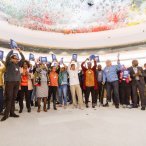English · Español

7 November 2017 | Interviews | Water | Monitoring transnationals | Third round of UN negotiations for a binding treaty on transnational corporations and human rights | Land grabbing | Agroecology | Resisting neoliberalism | Human rights | Climate Justice and Energy | Social activists at risk
A view from Africa: grassroots struggles as the basis for the UN process towards a binding treaty on transnational corporations and human rights
Download: MP3 (995.8 kb)
Giant agribusiness project “ProSavana” and the Mphanda Nkuwa dam on the Zambezi River, both of them in Mozambique, were denounced in Geneva, Switzerland, in the framework of the UN negotiations for a binding treaty on transnational corporations and human rights.
These are two projects that are not in operation yet and Mozambican activist Erika Mendes, of Justiça Ambiental (JA!) – Friends of the Earth Mozambique, demanded in Geneva the right by communities to say “NO”, to decide which investments and projects they don´t want in their lands and what alternatives they do want to implement. Justiça Ambiental and the Southern Africa Campaign to Dismantle Corporate Power, part of the Global Campaign with the same name, lauched a joint work effort to demand this right.
Mendes is the coordinator in said organization of a legal capacity building project for communities, which aims, among other things to set legal precedents for the defense of human rights. In the interview with Real World Radio held in Portuguese, the environmental activist considered it is important to have grassroots struggles as a basis, such as in the cases of ProSavana and the Mphanda Nkuwa dam, to learn about the demands and difficulties of communities to access justice in countries such as Mozambique, where the legal processes take many years and many times they find no response. “These are the experiences that need to feed the process of this UN binding treaty, otherwise nothing of this makes sense”, said Mendes.
The interview was conducted on October 28th in Geneva, the following day after the end of the third round of negotiations of the UN Human Rights Council Working Group towards a binding treaty that forces transnational corporations to respect human rights and allows to hold them accountable if they don´t. Mobilizations were held in parallel in the same city by social movements and organizations that are part of the Global Campaign to Dismantle Corporate Power (with members from the five continents) to push for the new Treaty.
The ProSavana program has been studied by environmental federation Friends of the Earth International for being one of the largest multilateral investment projects in Africa. It is promoted by the governments of Mozambique, Brazil and Japan to deliver 35 million hectares to agribusiness that today are in the hands of small Mozambican farmer communities.
Meanwhile, social organizations from the African country are warning that the Mphanda Nkuwa dam could cause serious environmental and social impacts that would affect local communities that depend on the Zambezi river for their survival. Thousands of people would be displaced to produce electricity to be exported to South Africa.
Both cases were also exposed at the Permanent Peoples´ Tribunal that held its latest session in August in Johannesburg, South Africa, organized by the Southern Africa Campaign to Dismantle Corporate Power. The Tribunal allowed eight countries of the region to expose the impacts caused by transnational corporations. Bringing these cases to a new round of negotiations in Geneva was important for the Southern Africa Campaign.
Mendes considers that the ProSavana program is an excuse for the “usurpation of lands at ridiculous levels”. The activist explained that the process is undergoing consultations, but not in a transparent way. The information that has been released was due to the pressure of organizations and social movements.
About the week of negotiations in Geneva for the binding treaty on transnational corporations and human rights, Mendes considered that the behavior of the European Union and countries like Mexico and Russia that attempted to block the process was “frustrating”. Nevertheless the final outcome was positive, she stated, because thanks to the pressure by social organizations and the work of countries like Ecuador (chair of the UN working group) and South Africa, a draft of said binding treaty will start to be negotiated in 2018. It has been known for a long time that voluntary principles and corporate social responsibility don´t work to make transnational corporations respect human rights, concluded Mendes.
Imagen: Víctor Barro, Friends of the Earth International







